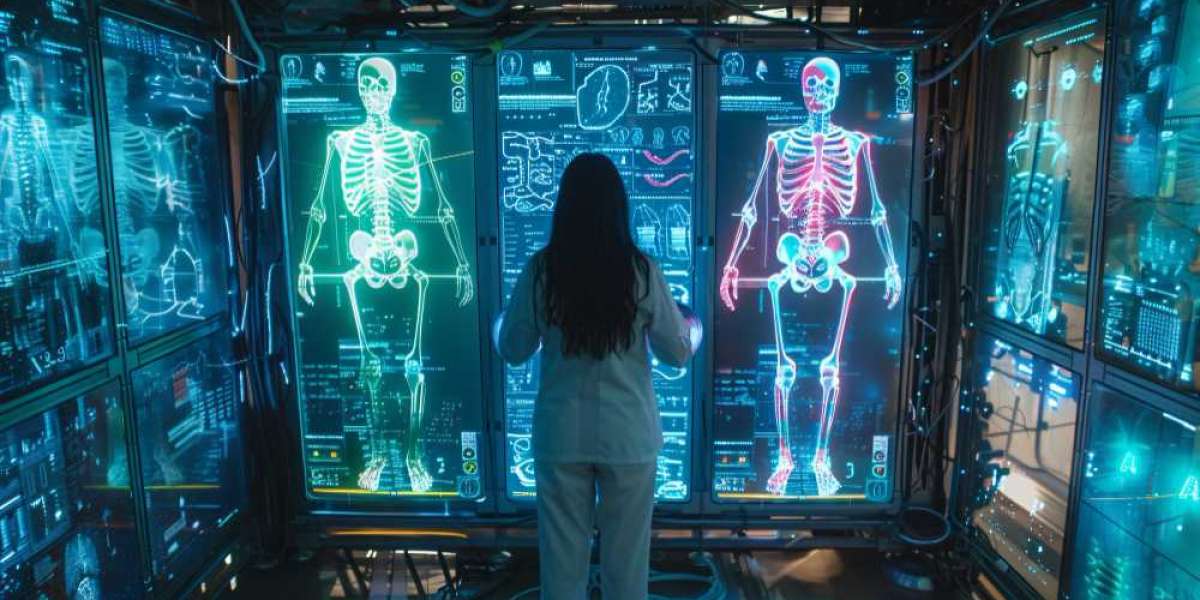1. AI-Based Symptom Checkers
AI-based symptom checkers have become one of the most widely discussed and accessible tools in healthcare. These AI-powered platforms use machine learning algorithms and natural language processing (NLP) to analyze patient-reported symptoms and provide potential diagnoses. With the ability to access vast databases of medical knowledge, these systems can help users identify possible conditions and guide them on the next steps for seeking medical care. By utilizing symptom checkers, healthcare providers can gain faster insights into patient conditions, improve diagnostic accuracy, and reduce the burden on medical staff. Popular tools like Ada Health and Buoy Health are examples of how AI is transforming primary care.
2. AI in Medical Imaging and Diagnostics
AI applications in medical imaging have shown remarkable promise, particularly in the interpretation of radiological images like X-rays, MRIs, and CT scans. AI algorithms, especially those based on deep learning, can analyze medical images with accuracy comparable to or even exceeding that of radiologists. For instance, AI is being used to detect tumors, diagnose fractures, and identify diseases such as cancer, cardiovascular conditions, and neurological disorders. AI-powered platforms, such as Zebra Medical Vision and PathAI, are revolutionizing diagnostic capabilities, enabling earlier detection, more accurate diagnoses, and more effective treatment plans.
3. Drug Discovery and Development
One of the most exciting applications of AI in healthcare is its role in accelerating drug discovery and development. AI systems can analyze large datasets to identify potential drug candidates, predict how molecules will interact, and optimize the design of clinical trials. This drastically reduces the time and costs associated with traditional drug discovery methods. AI can also assist in identifying biomarkers for diseases, improving the precision of treatment, and even suggesting novel treatments based on patient genetics. AI-driven platforms like Atomwise and Insilico Medicine are already making waves in the pharmaceutical industry by enabling faster development of life-saving drugs.
4. Predictive Analytics and Disease Prevention
AI’s ability to analyze large volumes of data makes it particularly useful in predicting patient outcomes and identifying individuals at risk for various conditions. By combining electronic health records (EHR), genetic data, and lifestyle information, AI can identify patterns and predict disease risk before symptoms even arise. This predictive capability is especially valuable in managing chronic conditions like diabetes, heart disease, and cancer. AI-based tools like Health Catalyst and Tempus are being used to guide early interventions, preventing the onset of diseases and improving patient outcomes.
5. Virtual Health Assistants and Chatbots
AI-powered virtual health assistants and chatbots have become an integral part of patient care, offering 24/7 support to individuals seeking medical advice or managing chronic conditions. These virtual assistants can answer questions, schedule appointments, remind patients about medications, and even provide mental health support. AI-driven health assistants, such as Babylon Health and MedeAnalytics, improve access to care, reduce wait times, and enhance the patient experience by providing personalized support.
6. Personalized Medicine and Treatment Plans
Personalized medicine, powered by AI, aims to tailor treatments to individual patients based on their genetic, environmental, and lifestyle factors. AI systems can analyze genetic data and medical history to suggest the most effective treatments and predict how patients will respond to different medications. This not only increases the chances of successful treatment but also minimizes side effects and drug interactions. AI tools like Tempus and Foundation Medicine are helping oncologists design personalized cancer treatments by analyzing genetic profiles of both patients and tumors.
7. AI in Robot-Assisted Surgery
Robot-assisted surgery has been enhanced by AI, enabling greater precision and control during operations. AI algorithms can assist surgeons by providing real-time insights during surgery, predicting possible complications, and helping guide instruments with extreme accuracy. For instance, AI-powered robotic systems like Intuitive Surgical’s da Vinci and Medtronic’s Hugo use AI to analyze data from various sensors and provide assistance to surgeons, leading to minimally invasive procedures, faster recovery times, and better patient outcomes.
8. AI for Administrative Efficiency and Workflow Optimization
In addition to clinical applications, AI is improving administrative efficiency in healthcare settings. AI-based systems can help manage hospital operations, including patient scheduling, billing, and supply chain management. By automating these tasks, AI reduces human error, optimizes workflows, and allows healthcare professionals to focus on patient care. AI tools are also used for fraud detection, ensuring compliance with regulatory standards, and streamlining back-office operations. These improvements in administrative efficiency can help healthcare organizations reduce costs and improve patient satisfaction.
9. AI in Remote Monitoring and Telemedicine
Remote monitoring of patients through wearable devices has become increasingly important, especially with the rise of telemedicine and home-based care. AI systems are integrated into wearable health devices, such as smartwatches and continuous glucose monitors, to track vital signs in real time. These devices use AI to detect abnormalities, send alerts to healthcare providers, and even suggest lifestyle changes to patients. With the global rise of telemedicine, AI is enabling healthcare professionals to monitor patients remotely and provide timely interventions. AI-driven platforms such as Livongo and Omron are revolutionizing remote patient monitoring.
10. AI in Healthcare Administration and Resource Allocation
AI is also helping optimize resource allocation in healthcare systems by predicting patient volume, managing hospital beds, and efficiently allocating medical staff and equipment. Through data-driven insights, AI can assist healthcare organizations in anticipating resource shortages, improving patient flow, and reducing waiting times. By accurately predicting demand, AI helps hospitals deliver efficient care while maximizing resource utilization. Qventus and DeepMind Health are key players in AI-based healthcare administration solutions.
The Global Market for AI in Healthcare
The global market for AI in healthcare is expected to grow at a significant pace, driven by advancements in technology, increasing healthcare data availability, and the rising demand for personalized care. According to industry forecasts, the AI healthcare market could reach USD 20 billion by 2030. Key factors contributing to this growth include the increasing adoption of AI-powered solutions in hospitals, the rising prevalence of chronic diseases, and improvements in regulatory approvals for AI-based healthcare applications.
Conclusion
Artificial Intelligence is poised to reshape the healthcare landscape in ways that were once thought impossible. From AI-based symptom checkers to robot-assisted surgeries, the applications of AI in healthcare are vast and promising. As AI technology continues to evolve and integrate with existing healthcare systems, its potential to improve patient outcomes, reduce costs, and enhance healthcare efficiency will be realized on a global scale. The future of healthcare will undoubtedly be shaped by the role of artificial intelligence applications, as they bring unprecedented advancements in clinical care, personalized medicine, and operational efficiency.
Latest Reports Offered By DelveInsight:
- Insights Into The Cutaneous T-cell Lymphoma Treatment Market
- Roche’s HEMLIBRA: A Game Changer in Hemophilia A Treatment Landscape
- Emerging Role of Digital Health in the Field of Oncology
- How Will Emerging Therapies Drift the Amyotrophic Lateral Sclerosis (ALS) Treatment Landscape
- How are Technological Trends and Innovations Reshaping the Dementia Care
More Reports
Non Alcoholic Fatty Liver Disease Nafld Market | Xerostomia Market | Adrenal Cortex Neoplasms Market | Arthroscopy Devices Market | Bone Anchored Hearing Systems Market | Cough Assisted Device Market | Neuroblastoma Market | Pharma Licensing Services | Allergic Rhinitis Market | Alpha-mannosidosis Market | Bronchopulmonary Dysplasia Market | Burkitt Lymphoma Market | Chronic Rhinosinusitis Market | Chronic Rhinosinustis Market | Contraceptive Devices Market | Febrile Neutropenia Market | Hepatitis B Virus Market | Minimal Residual Disease Market | Non-st Segment Elevation Acute Coronary Syndromes Market | Nsclc Market | Prefilled Syringes Market | Walking Impairment In Multiple Sclerosis Market | Acute On Liver Failure Market






